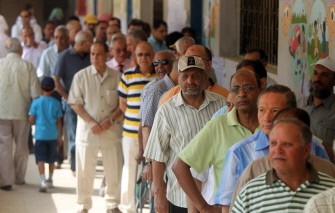It isn't yet nine in the morning, but Omneya Amer is already sweating as she waits outside a Cairo school to cast her ballot for the "least worst" candidate in Egypt's divisive presidential run-off vote.

In a grey and white headscarf, with sunglasses shielding her eyes, she explains that she is supporting Muslim Brotherhood candidate Mohammed Mursi, because she can't bear to vote for former prime minister Ahmed Shafiq.
"We're choosing Mursi because we don't want to vote Shafiq," the 42-year-old teacher says, dabbing at her forehead with a crumpled tissue as she peers in frustration at the dozens of women in front of her in line.
"All of us are voting for Mursi for the same reasons: he's the least worst. It's not because we like Mursi but because we hate Shafiq. He wants to bring back the old, decayed regime and I'm totally against that."
But nearby, a woman wearing a crucifix, who declines to give her name, says quietly: "It's not 'all of us.' For me Mursi and the Brotherhood are the worst. I'm voting for Shafiq."
Inside the women's voting station in the Manial district of Cairo, tempers fray as some accuse others of line-jumping while exasperated policemen try to mediate.
The light in one class room filters in from the door and a small window with bars on it, dimly illuminating a wall where someone has pinned up a newspaper front page from the day after the ouster of former president Hosni Mubarak.
Many voters clutch their own pens amid rumours that those at polling stations contain ink that will disappear after the ballots are cast.
"People, don't worry, the pens are fine, I promise!" shouts an observer in pink jeans and a fuchsia scarf, shaking her head as she explains to yet another woman that she must use the polling station's pen and not her own.
A nun in a grey dress and veil steps forward to cast her ballot, carefully folding it before depositing it in the semi-opaque ballot box.
Behind her is a women in the niqab. She lifts the veil from her face with her hands, which are covered in black gloves embroidered with flowers, so the female judge overseeing proceedings can verify her identify.
Each woman steps gratefully in from the sun, handing over her ID card in exchange for a ballot paper from the judge, who teases one voter as she gingerly dips her finger in the indelible ink used to prevent repeat voting.
"You waited all that time in the sun and you're afraid of a little ink!" she laughs.
Outside, Nesrine al-Abd, sporting a trendy pair of sunglasses and skinny jeans, said voting this time around "felt a bit weird."
"I feel a bit confused about the candidates but we have to choose, so I chose Mursi, because I feel that Shafiq accepted all the things that were done before the revolution," she said.
"But no one is choosing the candidate they like best. They choose the one they can live with. For me it's Mursi, but my mum and dad voted for Shafiq. They don't like him, but they are scared of the Brotherhood."
After casting her ballot, Nancy Abdel Moneim admits ambivalence about the vote as she adjusts her long veil nervously.
"I don't know how to feel," she says. "I'm with the revolution so I voted for Mursi ... But frankly I'm scared of one and scared of the other, so I picked the one I'm least scared of."
























